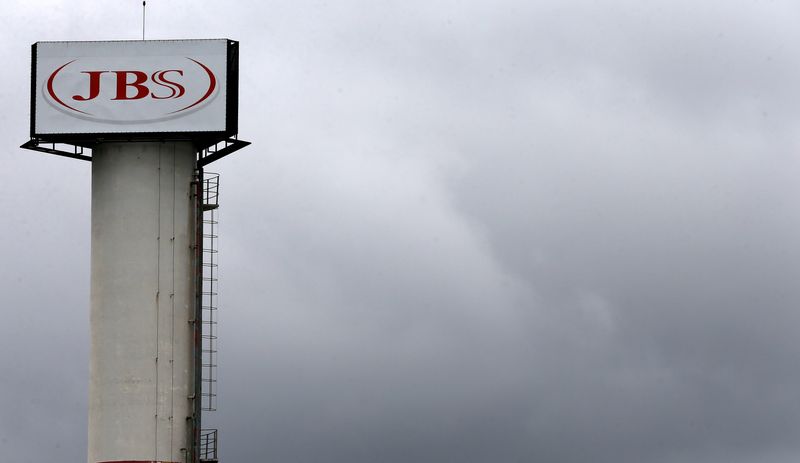
© Reuters. FILE PHOTO: The logo of Brazilian meatpacker JBS SA is seen in the city of Jundiai, Brazil June 1, 2017. REUTERS/Paulo Whitaker/File Photo
By Ana Mano
SAO PAULO (Reuters) – A Brazilian labor union has accused JBS SA (OTC:) of submitting dozens of workers to “degrading conditions,” according to a class action suit filed against the world’s biggest meatpacker and its suppliers this week.
The union filed the claim on behalf of at least 76 people, including members of the Terena Indigenous community, who were employed as third-party chicken catchers for JBS and worked in conditions “analogous to slavery,” the suit alleges.
Their shifts lasted up to 14 hours including the journey to and from the hen houses, said union leader Sergio Bolzan in a telephone interview. The work consisted of packing live chickens in boxes for transportation, some of which weighed as much as 24 kilograms (53 pounds), he added.
JBS is a primary defendant and four outsourcing companies are co-defendants in the suit, documents show.
In a statement, the company said it had not yet been notified of the suit and would investigate the allegations.
The suit claims workers did not get enough rest time, were not fully paid upon dismissal and did not get extra pay for performing hazardous work.
JBS says it maintains “strict protocols and controls in its operations to ensure that all its suppliers comply with their legal obligations and the well-being of employees.”
These obligations include providing adequate protective gear, safe working conditions and reliable means of transportation.
It also says it regularly conducts technical visits to supervise the work of catchers and to verify that everything is in order with suppliers.
Bolzan said evidence of alleged exploitation surfaced in April when he paid a surprise visit to where some catchers were being housed to document the conditions.
The union submitted that evidence on Tuesday to a court in Sidrolandia, in the state of Mato Grosso do Sul, where Bolzan said JBS employs 5,000 people directly and indirectly.
The union is seeking 400,000 reais ($82,000) in damages per worker and is pushing for prosecutors to formally join the suit as plaintiffs, documents show.
Bolzan shared his concerns with labor prosecutors, who confirmed preliminary investigations into the matter, including whether catchers were employed “off the books.”
($1 = 4.8831 reais)





